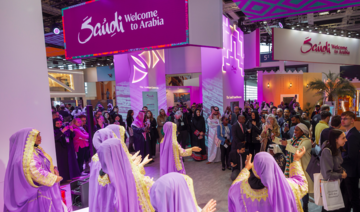RIYADH: As Saudi Arabia embarks on its ambitious journey outlined in Vision 2030, the hospitality industry emerges as a pivotal player in the Kingdom’s economic diversification efforts.
The sector continues to evolve, with a focus on attracting international visitors and enhancing domestic tourism experiences.
In 2023, the Kingdom’s travel industry not only met but exceeded expectations, experiencing a staggering 58 percent growth in passenger arrivals. This prompted a substantial recalibration of its Vision 2030 ambitions.
Last year, Saudi Arabia increased its annual tourism target to 150 million visitors by 2030 after surpassing the original goal of 100 million, seven years ahead of schedule. This achievement was attributed to the country’s ongoing investment in infrastructure, tourism transformation, hospitality, and real estate, aligned with its vision objectives.
Through capital allocation in the tourism framework, promotion of cultural heritage, and encouragement of innovation in the hospitality sector, the nation aims to unleash the Kingdom’s tourism potential and establish the region as a premier global destination.
Since Saudi Arabia opened its doors to non-religious tourists for the first time in 2019, the service and accommodation industry has been infused with new life.
With the announcement of a variety of hotels, resorts, and tourist attractions, the sector is positioning itself to meet the growing demand.
To achieve this, the Kingdom aims to increase its hotel room inventory by 315,000, projecting a development expenditure of around $37.8 billion by 2030. This expansion will bring the overall inventory to nearly 450,000 rooms.
David Vely, the vice president of development for the Middle East and Africa at Club Med, emphasized that experts in the field have witnessed firsthand Saudi Arabia’s ongoing efforts and investments to fulfill the criteria needed to meet its destination development and tourism targets.
He said: “Firstly, world-class infrastructure, including international airports and an advanced highway network, is crucial to facilitate tourist travel. Secondly, a variety of tourist attractions — from historical sites and beautiful beaches to modern entertainment centers — are needed to attract visitors. Thirdly, quality service and memorable experiences, coupled with professional and warm hospitality, are essential to retain tourists and foster positive word-of-mouth.”
Vely added: “We have observed Saudi Arabia’s ongoing efforts and investments to successfully fulfill these three criteria and are confident in its ability to achieve — and surpass — the ambitious goals of Vision 2030.”
Alongside investments in tourism infrastructure, which encompass transportation networks, airports, roads, and recreational amenities, initiatives such as NEOM, the Red Sea Project, and Qiddiya are expected to further bolster the nation’s hospitality sector.
In September, NEOM’s mountains destination, Trojena, revealed plans to host two Marriott hotels — a JW and a W. These establishments are among the numerous international inns set to open at the artificial ski retreat, which is slated to host the Asian Winter Games in 2029. The resort is scheduled to welcome visitors and new residents in late 2026.
Meanwhile, Red Sea Global, the visionary developer wholly owned by Saudi Arabia’s Public Investment Fund, boasts a portfolio that includes two world-leading destinations announced by Crown Prince Mohammad bin Salman: The Red Sea and AMAALA.
Collectively, these developments aim to enhance Saudi Arabia’s luxury tourism and hospitality sustainability offerings, with a focus on protecting the natural environment and enhancing it for future generations.
Emphasizing the importance of environmental awareness in the hospitality sector, Shahbaz Tufail, the executive vice president of DAR Engineering, noted that it is “crucial” to incorporate sustainability into new undertakings.
“The ongoing development of new entertainment options, as well as aligning value and service propositions to the international travel palette, clearly demonstrates the intent of Vision 2030. To appeal to a broader audience, providers must align with global hospitality and travel trends such as ecotourism, wellness, smart hotels and sustainability,” he said.
As a cornerstone of the sector’s development, both Vely and Tufail further stressed the importance of training and education in attracting and retaining talent within the hospitality field.
In order for this to happen, the industry needs to offer competitive compensation and benefits packages to attract skilled professionals into hospitality, and invest in training programs to develop new talent and up-skill existing team members, as noted by Ramine Benham, vice president of development at Minor Hotel EMEA.
“Collaboration with educational institutions to offer internships and graduate training programs, as well as vocational training programs can also help in providing a pipeline of future talent. By implementing these measures, the hospitality industry will be able to ensure that they employ the best talent and furthermore retain these loyal individual,” he added.
The nation has already begun to take strides in this direction, with the announcement of multiple programs and initiatives.
In September of last year, the country’s Minister of Tourism, Ahmed Al-Khateeb, declared the opening of the Riyadh School for Tourism and Hospitality during the 2023 UN Tourism “World Tourism Day” celebrations in Riyadh.
Inaugurating the launch, Al-Khateeb said: “This school is a gift from the Kingdom of Saudi Arabia to the world because it will be open to everyone to enjoy the best training in tourism and hospitality.”
This initiative aims to revolutionize industry education by attracting the brightest minds and leveraging cutting-edge technologies in an innovative facility.
Similarly, in April, a partnership was announced between the Kingdom’s Ministry of Tourism and UN Tourism for the launch of a six-month training program tailored for institutions in Saudi Arabia specializing in the sector.
TedQual, a certification system designed by the body to evaluate a series of universally applicable criteria, will help further enhance the quality and training of relevant organizations in Saudi Arabia.
The UN-backed tourism education scheme is poised to elevate the training of Saudi workers, enabling them to deliver the best international standards in the Kingdom.
As the nation gears up to host Expo 2030 in its capital, talent retention becomes imperative to meet the anticipated surge in hotel occupancy rates, with both international and domestic travelers seeking accommodation during the bustling period.
Furthermore, the forum represents a transformative opportunity for Saudi Arabia’s hospitality sector, driving growth and investment.
“Investors are drawn to opportunities in hotel development and resort projects due to the sector’s potential for substantial returns on investment,” Vely said.
“Moreover, a thriving hospitality industry enhances the country’s overall attractiveness as an investment destination, strengthening confidence among foreign investors and contributing to the country’s economic growth and diversification efforts,” he added.
To support the sector’s growth, investment, and attractiveness, Riyadh is poised to host the Future Hospitality Summit, which will focus on the future of successful hotel and destination development in the Kingdom as part of the event’s agenda.
The forum, scheduled to take place from April 29 to May 1, will discuss key factors affecting tourism development and explore strategies for overcoming potential challenges to ensure government targets are met.





















